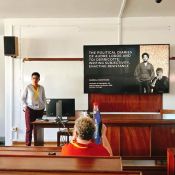
A space designed for the growth of its students
I’ll be honest: I arrived at the University of Nottingham to begin my PhD in Critical Theory and Cultural Studies with a great deal of fear. Although years earlier I had completed a master’s degree in the UK and already knew what it meant to study abroad, the doctorate felt like a much bigger leap—with an entirely different exigency. In a cold January, I packed a suitcase with my warmest coats, a generous supply of Mexican food, and, above all, my fear.
To my surprise, the fear stayed folded away between the clothes. From the very first day, Nottingham showed me that academic rigour does not have to mean exhaustion, and that quality is not synonymous with impossible expectations. Being in a demanding programme also means being in a space designed for the growth of its students: with resources available, with structures that encourage research, and above all, with a community that listens, engages in dialogue, and cares about the development of each of its members.
The University of Nottingham has given me a place to explore my voice, to test my ideas, and to grow as a researcher without losing sight of the human dimension. Here I have discovered that excellence does not suffocate—it inspires; that rigour does not paralyse—it propels; and that fear, after all, can remain in the suitcase.
- Gabriela

What I found exceeded all expectations
I arrived in Brighton to pursue an MA in Modern and Contemporary Literature, Culture and Thought at the University of Sussex. I chose the United Kingdom for the academic excellence of its universities, but what I found exceeded all expectations: learning extended far beyond classrooms, long hours in the library, and intense seminars.
That turbulent and exhilarating year was, in truth, a school of life. I discovered authors and theories that transformed the way I read the world; I tasted flavours my palate had never known; I faced a climate as whimsical as it was challenging for my Latin sensibilities; and I witnessed landscapes that seemed straight out of a Victorian novel. Beyond academics, I met people from unexpected corners of the globe, each with stories that broadened my horizons.
Today, the experience still reverberates in every aspect of my life. Brighton taught me how to inhabit the unfamiliar, to find beauty in the strange and, above all, to recognise myself amid the noise, the cold, and the wonder of a new place. On that journey, without realising it, I found myself.
- Gabriela

Opened doors I hadn’t imagined
Maybe I won’t start the way you’d expect; actually, it all began with a trip. I had never thought about studying in the UK, but I had always dreamed of visiting London. For as long as I can remember, it's been my favourite place, maybe because one of my favourite movies, The Parent Trap, has scenes in London, or because my grandparents told me stories about their trip and showed me pictures of the Changing of the Guard. London was my bucket list trip.
How did that lead me to study in the UK? Honestly, if someone had told me that I wouldn’t just travel, but that a few months after fulfilling my dream of visiting London, I would move to get my master’s degree, I would have laughed. It seemed impossible. But while planning the trip, Instagram’s algorithm took me to a link for a webinar by Across the Pond about studying in the UK. I just thought, why not? I connected out of curiosity, just to see what would happen.
My advisor, was the one who helped me choose the universities, apply, and made the whole process possible. I remember perfectly that I was returning from Stonehenge, on that same trip I told you about, when I got the email from the University of Winchester saying I had been accepted. What motivated me? The possibility.
When I think about my academic, personal, and cultural life here, I’d describe it as both enriching and intense. Lectures demanded a lot from me. Studying in another language was a challenge, but the university’s facilities and professors made the difference. I got to experience living in student accommodation, I joined the ultimate frisbee team, so I trained on weekends or went to matches against other universities. I also got a part-time job two months after arriving in the UK, an opportunity I had thanks to the university.
And of course, traveling, living here gave me the chance to visit Paris, Bruges, Brussels, and Ghent (so far), plus a few short trips around Winchester.
I’m taking away so many lessons. The master’s in Digital Marketing and Analytics gave me a new perspective. Studying the same field from another country, with different case studies and real client projects, gave me a global vision. Enjoying myself and being open to surprises is definitely one of the greatest lessons. Here I did things I’d never done before, like travel by train. Plus, living this experience helped me appreciate Mexico even more, and I noticed all the things we take for granted that just aren’t common here, especially when it comes to food.
I wish I had known or better understood the grading system. I know it sounds obvious, but the way they grade is different, and it takes a while to get used to the fact that here a 70 or 68 is considered a very good grade and you pass with 50. Another thing I wish I had known is that here, supermarkets and coffee shops tend to close relatively early, which is very different from what I was used to in Mexico.
Looking back, I am grateful for every challenge and opportunity this journey gave me. Studying in the UK transformed my perspective, helped me grow personally and professionally, and opened doors I hadn’t imagined. If you are considering this path, I encourage you to embrace the unknown with an open heart.
- Tanya Sofía

My Best “Ignorant” Decision Ever: Moving to York
The “Why” York
I had been searching for a long time for a program that combined sociology and technology in equal parts. Most of what I found was either too technical or too focused on the humanities. When I discovered the one at the University of York, I felt I had finally found the master’s program I truly wanted. The funny part is that I was so focused on the program itself that I didn’t research anything about the city. I just moved. And now, looking back, I always say it was my best “ignorant” decision.
A City That Won My Heart
York surprised me from the very first day. It’s one of those places that slowly works its way into your heart. The city is beautiful, full of history, with large parks, green spaces, and a city center full of things to explore. I had been an international student before, but I had never found it so hard to say goodbye to a place as it was with York. The people I met were incredibly kind, always up for a chat and with a sense of humor that made it easy to laugh about anything. Once I read on Instagram that York was “the friendliest city in the UK,” and I thought it sounded like an exaggeration, after all, how could you even measure that? But after living there, I can say that in my experience, it really was.
Community
At the university, I found an international community that welcomed me from day one. I connected closely with a fun and supportive Latin community, but I also made friends with people from all over the world. I was surrounded by kind people and meaningful conversations that opened my eyes to different cultures, industries, perspectives, and languages. Outside the university, I also met amazing people: at events organized by women’s groups in the city and even at a poetry group I stumbled upon by chance one Thursday night in a pub. I never felt alone, and that sense of belonging is what made my time in York unforgettable.
Food, Travel, and Weekends
York also gave me countless stories to tell. I’m a foodie, and even though British food isn’t the country’s strongest point, I found excellent restaurants with international flavors: Italian, Thai, Japanese, Colombian, Indian, and more. On weekends, I went to the Yorkshire Moors, the Dales, the Peak District, and other natural spots with stunning views and friendly people. York is surrounded by amazing landscapes for walking and hiking. Plus, the university societies organized the trips, so logistics were easy and I could just sign up and enjoy. Another great advantage is that York is less than two hours by train from London and only a few hours from Liverpool, Edinburgh, and other cities. Its location is perfect for exploring. I even used train rides to get ahead on essays or my thesis. Pro tip: the student railcard is a lifesaver for spending less and traveling more.
Support That Made This Possible
Across the Pond gave me free guidance and supported me for over two years of applications and scholarship searches, until everything finally aligned. Thanks to one of their online presentations, I discovered the program I had been looking for, and with their help, I was able to make this experience a reality. It’s not always easy to meet every deadline or stay motivated when you’re applying to several universities, and my advisor was key during those moments. She checked in with me even when I was least motivated or struggling to keep up, and I will always be grateful for that. Personally and professionally, I ended my year in York happier than I ever imagined.
My Advice: Take the Leap
If you’re considering studying in the UK, my advice is simple: take the leap. I am so grateful I chose York, even if at the time it was an “ignorant” decision regarding the city. Normally, I research and overanalyze everything in advance, but this time I stuck with the process, trusted the unknown, and it turned out to be the best decision I could have made.
- Ana Sofia

I think life is too short not to fight for our dreams, those that make us feel alive.
Studying in the United Kingdom
One of the main reasons that motivated me to study in the UK was the challenge of experiencing and adapting to a new and interesting culture such as the British one, as well as other language and a demanding educational system. In addition, the opportunity to see my country and the world from a different perspective inspired me greatly to live this experience.
For my university application process, I turned to Across the Pond. Their guidance was key in helping me understand the postgraduate requirements, prepare the necessary documentation, and manage the admission process in an organized way. They also provided valuable information on funding opportunities, including the Chevening Scholarship, which I was fortunate enough to receive.
One of the greatest challenges I faced was meeting the English language requirement. UK universities set high standards, as it is essential to understand and communicate ideas accurately in both academic and professional settings. My journey to obtain certification was demanding, I took several English proficiency exams (5 IELTS, 1 TOEFL iBT, and 5 Oxford ELLT), finally achieving the required score on my 11th attempt.
My preparation was exhaustive and consistent; however, I never lost sight of my aim. I was always looking for new ways and methods to improve my language skills, making sure to practice daily with discipline and determination.
I was certain about my objective and what it meant to me, so I knew that every attempt, every effort, and every moment of practice was bringing me closer to my goal.
The best experience of my life
I studied a MSc Advanced Mechanical Engineering with Aerospace at the University of Strathclyde, located in the heart of Glasgow, Scotland. The University provides excellent services and support for students. There are numerous student societies and social events to meet new people, expand your network, and develop new skills. The department staff were always attentive and kind, and we had access to an outstanding library. I was also fortunate to have highly qualified professors who were always willing to answer any questions.
Living in Glasgow and Scotland is a unique experience. The region offers a rich cultural and historical legacy, beautiful buildings and castles, fun and engaging events, and breathtaking landscapes. From cities such as Glasgow, Edinburgh, and Stirling to stunning scenery like the Isle of Skye and the famous Loch Ness in Inverness. Autumn is one of the most beautiful seasons when the entire city is painted in warm shades of brown.
Living in Glasgow, and especially in Scotland, is synonymous with being in one of the friendliest regions in the world. You truly feel at home, and there is always someone willing to help whenever you need it.
The cultural experience was equally fascinating and full of unforgettable moments. I met people from different corners of the world such as Lebanon, Ethiopia, Colombia, Iraq, and Bosnia who shared with me their vision of the world and of my country. They also introduced me to their cuisine, traditions, music, and customs. It was like traveling the world without leaving Glasgow.
Lessons learned
The lessons I take with me go far beyond the academic. In the classroom, I acquired advanced knowledge, learned new methodologies, and developed a global vision of my field of study. But the most valuable lessons were about life itself: perseverance, patience, and the understanding that dreams are achieved through constant effort.
I confirmed that obstacles are difficult but should not be seen as barriers rather, as opportunities to grow. Taking the English exam so many times taught me that each attempt was not a failure, but a chance to discover what I needed to improve. I also learned the power of resilience: adapting to a new environment, with a different culture, language, and way of thinking, made me stronger and more flexible.
Culturally, I take with me the invaluable experience of having lived with people from all over the world. I understood that diversity not only enriches but also opens the mind and breaks down prejudices. Today, I value empathy, collaboration, and respect for what is new and different more than ever.
What I take with me is the certainty that studying abroad is not just an academic experience, but a profound personal transformation that will stay with me for life.
What the journey taught me, beyond what I imagined
Adaptation takes time, and it is perfectly normal if things feel overwhelming at first. Nowadays, I confirm that those feelings are a natural part of the process, and with patience and openness, they transform into valuable lessons.
It is important to remember that asking for help is not a weakness, but a strength. Professors, classmates, and the community are always willing to support you if you open up and ask for it. Every cultural or academic challenge is, at its core, an opportunity to grow and discover new abilities within yourself.
You don’t need to have all the answers when you arrive. Allow yourself to make mistakes, learn from them, build self-trust, and enjoy every stage of the journey.
I am deeply grateful to my advisor, to Across the Pond for guiding me through the process, and to the Chevening FCDO Scholarship for helping me achieve this dream.
My best wishes for all of you to achieve your dreams as well,
- Luis





